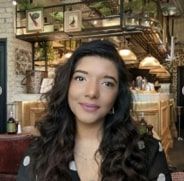
BSL first approach: Accessible health information is essential in tackling health inequalities for deaf people
Zohra Khan
- Health inequalities
- Communication and administration
- Lived experience
Approximately 9 million people in the UK are deaf or have hearing loss. Over 22,000 (0.04%) of the deaf population’s first or preferred language is British Sign Language. Deaf people continue to face barriers in mainstream health and social care services and often face poorer outcomes and experiences when navigating the healthcare system due to communication barriers, lack of deaf awareness from healthcare professionals and inaccessible resources. Since 1986, SignHealth, the deaf health and wellbeing charity, has been doing this vital work to address the significant health inequalities faced by thousands of deaf people across the UK. Our continued vision and purpose is a world without barriers to good health and wellbeing for deaf people.
SignHealth’s commitment to tackling health inequalities
SignHealth has been working hard for the past 36 years to tackle the health inequalities deaf people face. We are passionate about our mission to improve deaf people’s health and wellbeing. We are a British Sign Language (BSL) proud organisation. 70% of our staff are deaf and bring the power of their lived experience to work every day.
We’re incredibly proud to be a deaf-led organisation with specialist services and resources delivered in BSL. This support spans across the UK through our domestic abuse service, psychological therapy services, social care services and advocacy service. We partner with organisations, including the NHS, Healthwatch, RNID, Sense and others, to deliver services and develop research /reports on issues affecting our community, as seen in our ground-breaking Sick of It report, and Accessible Information Standard report. We raise awareness of the barriers our community faces and take action to end the damaging practices and shortfalls in health and social care services.
A big success for us recently, was our work with RNID (Royal National Institute for Deaf) and Ofcom to lead the change in 999 services. For the first time ever, we could call 999 in an emergency with the launch of 999 BSL in June 2022. Until this was in place, deaf people could not call emergency services. Before this, we were part of a coalition of deaf organisations who successfully campaigned for the 2022 BSL Act, for the legal recognition of British Sign Language. We want to continue the momentum towards delivering important change and improving the lives of so many deaf people.
Navigating an inaccessible healthcare system
We know access to information in BSL and interpreters for all appointments is a postcode lottery. Communication support is inconsistent, doesn’t meet our needs and places our lives at risk. The Accessible Information Standard (AIS), tell us the steps healthcare providers need to take to meet deaf peoples’ information and communication needs. However, our 2021 report tells us otherwise; 67% of deaf people surveyed reported no accessible method of contacting their GP was made available to them and 81% reported their communication needs were unmet when they had an appointment. This is just one of many examples of how we lack access to clear and efficient communication, depriving our community from critical information and quality health care.
The wider social determinants of health
We’re only successful in achieving our purpose of ending health inequalities if deaf people achieve equality in all areas of life within society.
Behind the scenes, we are planning a new campaign in partnership with several deaf-led organisations, our community, and allies to achieve deaf equity and end health inequalities. So many gaps still exist, and we need to do more. Inspired by Sir Michael Marmot’s 2010 report, Fair Society, Healthy Lives, we commissioned New Economics Foundation and the University of Manchester, Social Research on Deaf People to carry out research into the socio-structural determinants of inequalities affecting deaf people.
There is value and power in representation, people participation and lived experiences but healthcare services cannot deliver what our community need without taking on a personalised and integrated approach.
We’re calling for us to be at the heart of all decision making, with the needs and aspirations of our community actively listened to and represented across the healthcare system.
We’re passionate about ending the health inequalities we face. We can’t do this alone. We need to work together, to change the system and improve deaf people’s health and wellbeing. Together we are stronger. Will you join us?
Visit the SignHealth website to find out more about the work we do.
Biography
Zohra Khan is the Campaigns Manager for SignHealth, a deaf health and wellbeing charity.